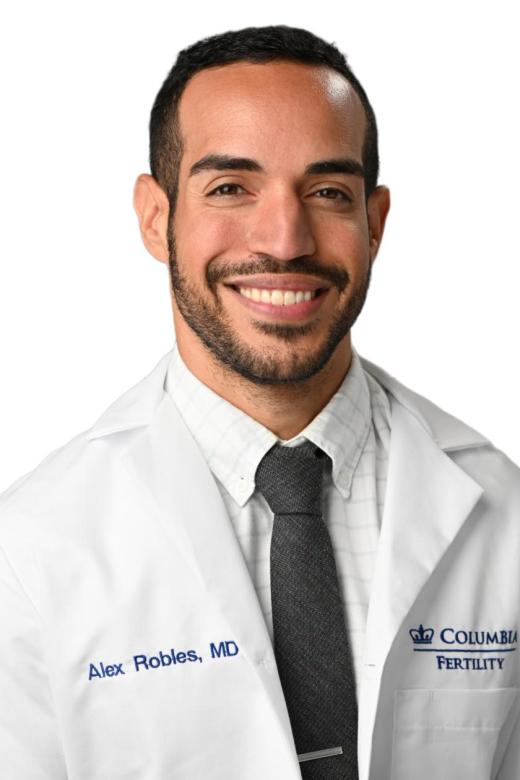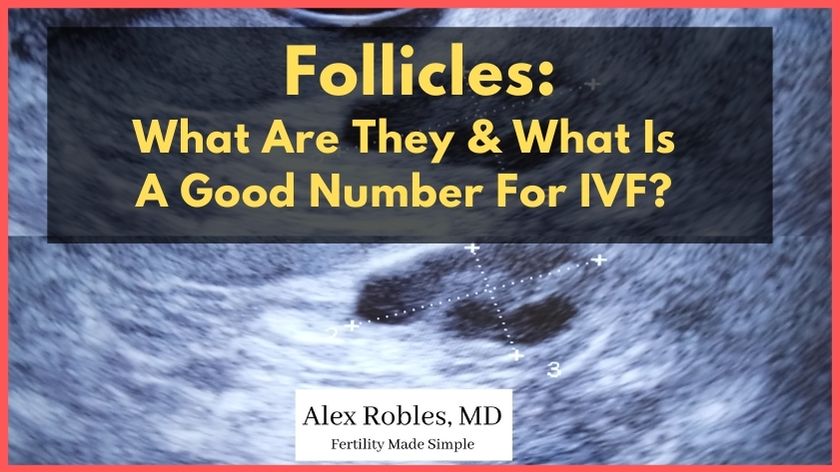Are you trying to get pregnant and wondering when you should see a reproductive endocrinologist?
In this post you are going to learn:
- When you should seek fertility treatment,
- What a reproductive endocrinologist does, and
- What happens at the initial appointment.
Let’s get started!
![When Should You See A Reproductive Endocrinologist? [A Helpful Guide] cover image](https://alexroblesmd.com/wp-content/uploads/2021/07/when-should-you-see-a-reproductive-endocrinologist.jpg)
When should you see a reproductive endocrinologist (RE)? 12 Common Reasons
You should see a reproductive endocrinologist if:
1. You have been trying to conceive for 12 consecutive months and have been unable to achieve pregnancy.
This recommendation is used if the female partner is under 35 years old. The time frame drops to 6 months if the female is over 35 years of age, and immediately if over 40.
2. You are a woman with a known infertility diagnosis.
Common examples include a history of blocked fallopian tubes, surgically removed fallopian tubes, or a prior tubal ligation (aka you had your “tubes tied.”)
3. You have been diagnosed with cancer and you are interested in fertility preservation
Prior to undergoing cancer treatment, you should see an RE urgently as chemotherapy and radiation can cause fertility problems in the future.
4. You are single and interested in egg freezing to preserve your fertility potential.
Natural fertility begins to decline after age 35. Many women opt to freeze eggs around this time if they are single.
5. You have a known uterine anomaly that can interfere with implantation
The most common uterine anomaly is a uterine septum. Uterine fibroids inside of the cavity can also cause infertility.
6. You have a condition that can lead to early menopause.
The most common genetic cause of early menopause is Turner’s syndrome. Early menopause can also run in families.
7. A male partner has a condition that can lead to sperm abnormalities such as a low sperm count.
There are numerous environmental, genetic, or anatomic factors that can impair sperm production.
8. If you and/or your partner have a known genetic condition that you don’t want to pass on to your children.
Common examples include BRCA, Lynch syndrome, Cystic Fibrosis, Sickle Cell Anemia etc.
9. If your partner is of the same sex.
Donor sperm and donor egg can be used to help same sex couples conceive.
10. You cannot carry a pregnancy and need a gestational surrogate.
Some women are born with an underdeveloped or absent uterus. Others cannot carry pregnancies for medical reasons.
11. You are a single female and desire pregnancy through the use of donor sperm.
12. You have recurrent pregnancy loss (aka multiple miscarriages).
Recurrent pregnancy loss is defined as two or more clinical pregnancy losses aka miscarriages.
This is not an exhaustive list, but it encompasses the most common reasons why you would see an RE doctor.
What does a reproductive endocrinologist do?
A reproductive endocrinologist specializes in the treatment of infertility and other medical conditions that can cause reproductive issues.
They will help you undergo fertility testing, interpret those results, and provide medical assistance in achieving a healthy pregnancy.
Reproductive endocrinologists are primarily involved with the female side of reproductive health. A reproductive urologist on the other hand specializes in male infertility.
What happens at a reproductive endocrinology appointment?
In general, four things will happen at the first appointment.
- A detailed medical history will be taken
- A trans-vaginal (or sometimes trans-abdominal) ultrasound will be performed
- Bloodwork will be taken to analyze your hormones
- Counseling
Let’s go over them in more detail.
Medical History
A reproductive endocrinologist will take an extensive medical history from you and your partner (if applicable).
This will include:
- How long you have been trying to conceive
- Prior pregnancy history
- Prior medical or surgical history
- Details on your menstrual cycle history
- Prior gynecological history
- Family history of pregnancy-related issues or other genetic issues
- Current medication use
- And more
The history taken at the first visit may give clues as to why you might be having trouble getting pregnant.
Ultrasound
The second thing that will likely happen is an ultrasound evaluation.
Often times the ultrasound is done vaginally as this will allow the best view of your uterus and ovaries.
This ultrasound will also help us count the number of follicles we see in each one of your ovaries.
Bloodwork
The last thing you will have done is blood work.
Here, you will have your hormones checked such as your:
- Thyroid hormone levels
- AMH levels (which helps quantify ovarian reserve or the number of eggs left in your ovaries), and
- Menstrual cycle hormones such as estrogen, follicle stimulating hormone (FSH), luteinizing hormone (LH), and progesterone depending on where you are in your menstrual cycle
Counseling
After this initial assessment, your doctor will give you their first impressions.
You may be told about the different types of fertility treatments that can be offered.
Assisted reproductive technologies include:
- Ovulation induction with timed intercourse
- Ovulation induction with intrauterine insemination (IUI)
- Natural cycle monitoring with timed intercourse or IUI
- In vitro fertilization
Prior to deciding on the best treatment plan for you, you and/or your partner may be scheduled for a few other tests to look for any other causes of infertility.
These may include:
- Hysterosalpingogram
- Saline sonogram
- Semen analysis (for the male partner)
What questions should I ask my fertility specialist?
Here are some questions you should ask your fertility specialist after your initial assessment.
- How many follicles do I have? Is it a normal amount relative to my age?
- What is my AMH level? Is it normal relative to my age?
- What are my treatment options?
- Which treatment option would give me the best chance of success given my age and my results?
- Which treatment option will be the most cost-effective?
- What are my realistic chances of success (based on success rates of other couples with a similar situation to mine)?
- What can I do to optimize for a healthy pregnancy?
Can a gynecologist detect infertility?
A gynecologist can detect infertility if they diagnose you with a condition that can impact your ability to conceive such as:
- Blocked or absent fallopian tubes
- You don’t get periods regularly (oligomenorrhea)
- You don’t have a uterus
- Your hypothalamic hormones are not working
In the absence of known conditions like the ones above, anyone can detect infertility if you have been unable to achieve pregnancy after 6-12 months of regular unprotected intercourse.
However, if you require more extensive fertility testing, you should see an infertility specialist.
Other Related Questions
How do I know if I’m infertile?
A common question often asked is – How can I check my fertility?
Unfortunately there is no fool proof way to check that you are infertile unless you have been trying to conceive for months and are unable to.
Approximately 10-15% of couples will need fertility assistance for one reason or another.
If you are unsure, speak with your gynecologist and they can refer you to an REI if appropriate.
Can an endocrinologist help with infertility?
An endocrinologist can help with infertility if you have a hormonal issue contributing to your infertility such as hypothyroidism, hyperprolactinemia, hypothalamic amenorrhea, or polycystic ovarian syndrome (PCOS).
A reproductive endocrinologist can usually treat some of these conditions as well- but may enlist the help of a traditional endocrinologist in special cases.
Is a reproductive endocrinologist the same as a fertility specialist?
Yes, a reproductive endocrinologist is synonymous with a fertility specialist.
You might also hear us referred to as a “fertility doctor” or “infertility doctor.”
This is a doctor who has completed a 4-year residency in general obstetrics and gynecology and a 3-year fellowship in reproductive medicine.
You should also ensure that your doctor either has a board certification or is board eligible.
Conclusion
You should see a reproductive endocrinologist if you have been unable to achieve pregnancy in 6-12 months depending on your age, or you have a condition that impacts your reproductive system in any way.
Your first consultation will include a detailed history and physical examination, ultrasound evaluation of your uterus and ovaries, and blood work.
If you think you may have infertility, don’t delay in getting an evaluation!
Keep Reading:
- IUI vs IVF: Which Is Right For You?
- The IVF Timeline: How Long Does it Take?
- The IUI Timeline: The Step by Step Process
Make An Appointment With Dr. Robles To Discuss Your Fertility Options Today!

Alex Robles, MD
Dr. Alex Robles is a Spanish-speaking Latino-American Reproductive Endocrinologist and Infertility specialist in New York City, and a board-certified OBGYN. He has a special interest in health, lifestyle, & nutrition. Make an appointment with Dr. Robles to discuss your fertility options today!

